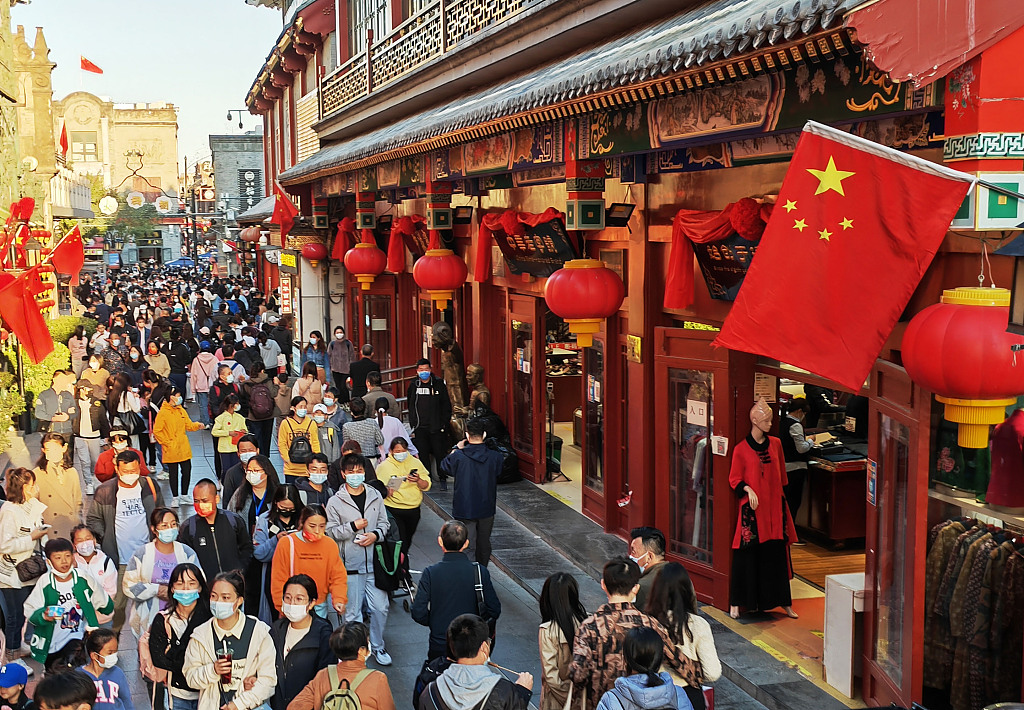
Cars drive through Times Square in New York, United States, January 17, 2023. /CFP
Cars drive through Times Square in New York, United States, January 17, 2023. /CFP
Editor's note: Huang Yongfu is an economic affairs commentator. After earning a PhD, he started his career at the University of Cambridge and then moved on to the UN system. His current interests lie in global development and Sino-U.S. links. The article reflects the author's opinions and not necessarily the views of CGTN.
According to the World Economic Outlook (WEO) update published by the International Monetary Fund (IMF) on January 31, global growth will witness a turning point of bottoming-out in 2023. The global economy is poised to slow from an estimated 3.4 percent in 2022 to 2.9 percent in 2023, then rise to 3.1 percent in 2024. The outlook is less gloomy than in its October forecast, but growth will remain weak against the historical (2000–19) average of 3.8 percent.
Despite headwinds associated with central bank rate hikes to fight inflation and Ukraine crisis, IMF attributes a faster-than-expected recovery to China's recent reopening as well as strong labor markets, robust household consumption and business investment, and better-than-expected adaptation to the energy crisis in Europe.
U.S. set a bad example for advanced economies
Advanced economies see their economic vitality ebb away and face a profound problem of economic decline, from 2.7 percent in 2022 to 1.2 percent and 1.4 percent this year and next respectively. Nine out of 10 advanced economies will likely decelerate. Growth in the U.S. and Euro area will slow to 1.4 percent and 0.7 percent in 2023 respectively, as central banks' tightening monetary policy works their way through the economy.
Much of the slowdown was preordained due to vanished appetite for growth-enhancing structural reforms and growing support for populism and protectionism of Western governments, in addition to some immutable forces such as fast-ageing populations.
Western governments prefer splurging the growth benefits by spending a lot more on welfare, such as pensions and health care, to structural reform, like changes to regulations, extensively implemented before 2010s to make their economies sleeker. High levels of debt resulted have nevertheless constrained policymakers' room for maneuver.
A wave of populism across advanced economies began in 2016 with Brexit and the election of Donald Trump, who hindered long-term prosperity by undermining the global trading system.
Today's Western politicians seem to believe that liberal capitalism or free trade is to blame for the growth slowdown. They are more likely to express anti-growth sentiments and extol industrial policy and governmental intervention and protection to achieve economic success, while less likely to appreciate the coherent relationship between market and the state than their predecessors such as Lyndon Johnson, Margaret Thatcher and Ronald Reagan who buzzed with policies that support free markets.
With a deliberate effort to become more self-sufficient and attack its geopolitical rivals, the U.S. has actively advocated "friend-shoring" that cripples multilateralism, decouples the global supply chains and leads to fragmentation of global trading system. A fragmented trading system restricts trading opportunities among divided trading blocs that could hurt both rich and poor nations.
A right direction for the West is to embrace free trade and initiate necessary structural reforms in relation to housing, immigration and tax systems.
China's enormous market could give emerging economies a boost
As a group, emerging market and developing economies have already bottomed out, with growth projected to rise from 3.9 percent in 2022 to 4.0 and 4.2 percent in this and next year. However, about half of emerging market and developing economies have lower growth in 2023 than in 2022. Slower growth contributes to political instability and governance crisis, and fuels despair and unrest in much of the emerging world, which could limit governments' ability to tackle pressing policy problems and deter foreign investment.
During the first two decades of the millennium, sustained and broad-based growth in developing economies became a source of unbounded optimism and burning ambition for "catch-up" in the sense that poorer countries could grow faster than advanced ones in terms of the level of economic output per head, as demonstrated by the BRICS (Brazil, Russia, India, China and South Africa). The catch-up has momentous implications for global order where a new multi-polar world is made up of various developed and developing countries.

Crowd flock into a pedestrian street in Beijing, China, October 4, 2022. /CFP
Crowd flock into a pedestrian street in Beijing, China, October 4, 2022. /CFP
In recent years, much of the emerging world has been condemned to a long period of slower growth by the legacy of the stumbling block of the pandemic and the persistent headwinds of climate change from the nature as well as rising protectionism and rate hikes from the West. The legacy exacerbates a profound economic problem that many low- and middle-income countries are losing capability to catch up with the advanced ones.
The pandemic has exposed vulnerabilities, from disease control, rotten bureaucracies to frayed social safety-nets. The developing world is vulnerable to the pandemic, especially the old. So many children have suffered from educational setbacks, undercutting human capital, labor forces and long-term productivity.
The climate change hit the poor the hardest. Emerging�market governments and people will face loss and damage and feel most heavily the growing economic costs of climate change.
The spread of high interest rates in advanced economies to tame inflation could lead to crashing asset prices, capital outflow from the emerging world and catch out some governments already overburdened. The U.S.-led West has also increased protectionism that limits export opportunities for foreign producers.
With tighter monetary conditions and lower growth in the West, it is necessary to deploy macroprudential tools and strengthen debt restructuring frameworks to ensure financial and debt stability.
Given growing populism and protectionism in the West, it is essential to strengthen multilateral and bilateral cooperation, boost the rules-based multilateral system, open up their economies to trade, compete in global markets, absorb foreign technology, invest in manufacturing, infrastructure and education, and improve universal access to digital technologies and social safety-net.
A central threat stalking developing economies as well as global economy is related to global demand shock rather than supply shock, as rising global interest rates, a strong dollar, along with interruptions to global production and shipping has weighed on consumer and business demand globally.
China's enormous domestic market has become a vast source of consumer demand including manufactured goods for other developing economies. The Chinese economy is gearing up for a strong rebound in activity and mobility, motivated by its reopening in early January.
(If you want to contribute and have specific expertise, please contact us at opinions@cgtn.com. Follow @thouse_opinions on Twitter to discover the latest commentaries in the CGTN Opinion Section.)